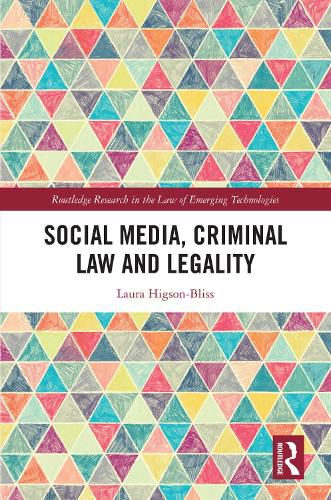Readings Newsletter
Become a Readings Member to make your shopping experience even easier.
Sign in or sign up for free!
You’re not far away from qualifying for FREE standard shipping within Australia
You’ve qualified for FREE standard shipping within Australia
The cart is loading…






Utilising Lon Fuller's conception of legality, this book argues that current legal provisions often used to control online abuse aided by social media do not conform to the basic principles of legality in the criminal law, in turn, threatening freedom of expression.
How we regulate inappropriate behaviour online, often referred to as online abuse, particularly online abuse aided by social media, is a contemporary concern for governments across the globe. Tragedies, such as the death of a celebrity following a campaign of online abuse, often hit the headlines, followed by the same echo: there should be a law against this. Yet, in England and Wales, numerous laws exist to control, prosecute, and convict individuals who use the likes of social media to harass, intimidate, and abuse others online. So why is the law failing to keep pace with modern technology? This monograph critically examines this fundamental question, from the perspective of legality. Applying criminal law to three growing areas of concern, it covers: (1) racist speech, (2) cyberharassment/cyberstalking, and (3) the sending of abusive messages online. It then turns to examine the latest attempts by UK officials to tackle these issues through the implementation of the Online Safety Act 2023 and France's, Germany's, and India's attempts to regulate social media.
The book will be of interest to researchers in the field of criminal law and cyber law, as well as online abuse, harassment, and discrimination.
$9.00 standard shipping within Australia
FREE standard shipping within Australia for orders over $100.00
Express & International shipping calculated at checkout
Utilising Lon Fuller's conception of legality, this book argues that current legal provisions often used to control online abuse aided by social media do not conform to the basic principles of legality in the criminal law, in turn, threatening freedom of expression.
How we regulate inappropriate behaviour online, often referred to as online abuse, particularly online abuse aided by social media, is a contemporary concern for governments across the globe. Tragedies, such as the death of a celebrity following a campaign of online abuse, often hit the headlines, followed by the same echo: there should be a law against this. Yet, in England and Wales, numerous laws exist to control, prosecute, and convict individuals who use the likes of social media to harass, intimidate, and abuse others online. So why is the law failing to keep pace with modern technology? This monograph critically examines this fundamental question, from the perspective of legality. Applying criminal law to three growing areas of concern, it covers: (1) racist speech, (2) cyberharassment/cyberstalking, and (3) the sending of abusive messages online. It then turns to examine the latest attempts by UK officials to tackle these issues through the implementation of the Online Safety Act 2023 and France's, Germany's, and India's attempts to regulate social media.
The book will be of interest to researchers in the field of criminal law and cyber law, as well as online abuse, harassment, and discrimination.